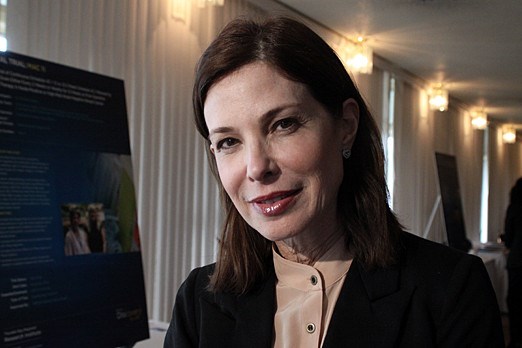Television host and author Dr. Marla Shapiro says her experience with cancer helped her see clinical trials through a whole different perspective.
Shapiro, host of Balance: Television of Living Well, wrapped up the two-day annual Thunder Bay Regional Research Institute retreat, which started on Friday at the Fort William Country Club, with a discussion on the patient perspective during randomized clinical trials. Shapiro gave a personal account of what it was like to go through the process herself.
Doctors diagnosed her with cancer in 2004 and she decided to go through random clinical trials herself. Her doctor offered her two options of treatments and she had to choose one. Having practiced medicine for many years, Shapiro said her experience as a patient gave her a completely different outlook.
“I certainly can understand the overwhelming sense of fear and uncertainty that blindsides you,” Shapiro said. “That’s all you see in the beginning is fear and anger. You’re so overwhelmed and the last thing you want to do is make any decisions. You really need to take time as a physician to help your patient listen to what you are saying. The emotion of fear is all that’s there. I like to say to my patients you have time. I know you feel you don’t but you have had that cancer for a long time.”
She said what people need to understand is that the doctors are giving the patients the best information they have right at that moment and neither option is inferior than one and other but one may prove to be better later on down the road.
The whole process can become overwhelming but clinical trials are the best method available to get the best information in order to get the best medical treatment, she said.
“Often when we say to a patient that there are different treatment arms that you can have this or you can have that and we’re doing a study about that you hear two things – you don’t know what to do to make me better doc and why are you putting me in an experiment,” she said. “We’re asking you to participate along with scientists to help us not only treat you but treat you better and treat generations to come better.”
Michael Power, CEO of Thunder Bay Regional Research Institute, said Shapiro and the other speakers were all part of helping to make the institute better.
“We are a community that’s on a journey to build an academic health sciences environment,” Power said. “We’re committed to inviting tomorrow’s healthcare and to do so it means we have to translate those ideas and those finding. So what did we learn? We learned about the infrastructure to do it, about the support physicians need, very busy physicians that have very long patient waiting lists. It's about patient engagement and listening to patients."
Sign in or register
- Messages
- Post a Listing
- Your Listings
- Your Profile
- Your Subscriptions
- Your Likes
- Your Business
- Support Local News
- Payment History
Registered Users
Already have an account?
New Users
Create a free account.
